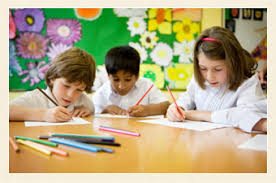Weekly Series — Developing Young Thinkers
Time Traveler #1 “What is your position? over”
Time Traveler #2 The dinosaurs are getting closer, I’m running into the trees now”
Time Traveler #1 “Find your nearest base camp and put on your invisible shield”
Time Traveler #2 “Copy that, I am at the top of the tree, shield on, am invisible. Going to set my time coordinates for the middle ages”
Those are some of my childhood memories playing in the orange groves behind our house. Our neighborhood was full of adventure and magical worlds. I would meet up with the wide range of local kids ready for the day’s adventure. We would argue and discuss what new universe we would escape into and play until the sun went down. It would all start over the next day.
Lev Vygotsky, Russian psychologist, believed that social interaction builds a critical role in children’s learning. Make believe play is a leading activity that promotes cognitive emotional and social development.
In play children are able to create an imaginary situation that they can talk about and act out roles. They are able to follow a predetermined set of rules based upon those specific roles.
Living in a world of play was the norm when I was growing up. I was fortunate to live in a time where the neighborhood was active and connected. With younger and older kids all playing together, there was a natural mentor-ship. Roles and rules of games were passed on from generation to generation.
Vygotsky’s research showed that play influences development in a number of ways.
- It supports many areas of cognitive development. Playing within a role allows for practice of and scaffolding of skills.
- It helps to develop abstract thinking.
- It facilitates self-regulation.
- It increases motivation.
- Role playing helps develop perspective taking skills.
According to Vygotsky, developmental accomplishments become apparent in play far earlier than they do in other activities. In a 4 year old, higher levels of attention, symbolizing and problem solving are observed in play more than in other situations.
If a child has no play experience it is likely that their cognitive and social emotional development will suffer. Play is the leading activity for children ages 3–6. According to Vygotsky, group play has a unique role at this developmental period and cannot be replaced by any other activity.
Higher education continues to cultivate environments that promote collaboration skills. At the same time, the available time for real play for children continues to decline.
Get your children out to play. Don’t worry about finishing that math assignment.
I hope this was helpful. All your comments and input are greatly appreciated. Don’t forget to join our newsletter at daVinci Publishing



